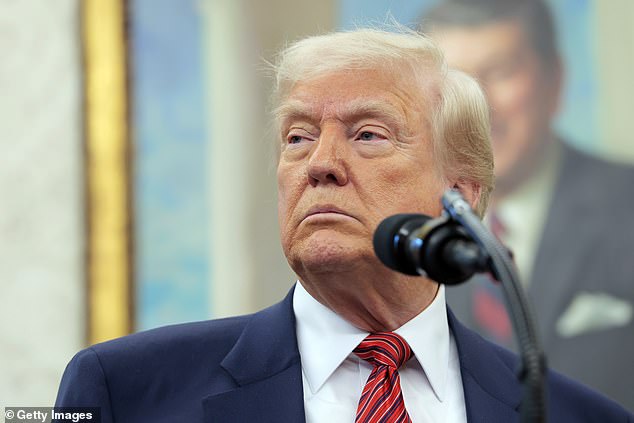Under more normal circumstances the Bank of England’s interest rate-setters look across the Atlantic for leadership on interest rate changes. British gilt yields often move in lockstep with US Treasuries.
Donald Trump’s tariff policy changes the dynamics. Despite progress on trade deals, including an accord with the UK, there is a conviction among heavyweight investors that an American recession has become more likely.
The imposition of levies on free trade, despite breaks for electronic devices, increases the inflation impulse in the American economy.
This tug-of-war between output and prices is the main reason why the Federal Reserve held the official federal funds rate in the 4.25 per cent to 4.5 per cent range last night.
In contrast, the Bank of England, which will unveil its decision today is widely predicted to cut rates by at least a quarter of a percentage point, from 4.5 per cent.
A second political factor is playing out. On April 21, President Trump urged Fed chairman Jay Powell to make pre-emptive interest cuts and labelled him a ‘major loser’ for failing to lower rates.

Disruptor: Donald Trump’s tariff policy has led to conviction among heavyweight investors that an American recession is looming
Trump’s hostility and the threat to central bank independence might, if anything, lead Powell to hold off, even if there is growing evidence of a slump.
Data from the first quarter showed output dropped by 0.3 per cent on an annualised basis. Forward-looking indicators are pointing in the wrong direction.
As a founding member of the Bank of England’s Monetary Policy Committee DeAnne Julius pioneered the idea of looking at unconventional data such as freight rates.
Shipping news is capturing the attention of analysts in the US because of tariff uncertainties.
Initially, there was a flood of containers as US retailers stocked up on furniture, clothing and electronics. As time moved on, ocean carriers have been cancelling Pacific sailings.
At Los Angeles docks, imports are estimated to be 35 per cent down on last year. Orders for heavy trucks are plummeting, and Dow Jones transport stocks have plunged 9 per cent – the sharpest decline in a decade.
This may quickly reverse if the White House unveils new trade arrangements.
An accommodation with China is most important. But supply chains can be slow to recover. Postponing a pre-emptive American rate cut could be a serious error.
Indian givers
War is always unfortunate. The hostilities between nuclear-armed India and Pakistan could not be more troubling.
With China cast into the outer darkness, India, the world’s fifth-largest economy (having displaced Blighty), is becoming a magnet for overseas investors.
Apple boss Tim Cook, having been forced out of the People’s Republic, is vowing to assemble most of his US-bound iPhones in India by next year.
The conflict has come when the ink on Sir Keir Starmer’s ‘landmark’ trade deal between Britain and India barely was dry.
Putting aside the political ding-dong – notably around the national insurance escape for Indian workers coming to the UK – the pact gives hope to better commercial conditions for UK firms.
It remains galling, however, that Britain’s booming financial and professional services sector is not being given the support and free range it desires.
Washington has long had a fractured relationship with India because of its cordial relations with Moscow. But there is US speculation that New Delhi will be an early beneficiary of a Trump trade deal.
Conflict may benefit the arms trade but can disrupt normal business. Several Indian states are preparing security drills.
That threatens power supplies and the stability of back offices for Western corporations which have outsourced tech to India. As if the ransomware penetration of systems at UK retailers was not hazardous enough already!
Home-grown
Visitors to Washington DC would find it hard to miss the BAE Systems logo on a modern edifice on the freeway into town from Dulles airport.
Investors learned at BAE’s annual meeting that Trump’s tariff policy is not an issue for the British defence and aerospace engineer. Its US operations use a domestic supply chain. Sensible.
DIY INVESTING PLATFORMS

AJ Bell

AJ Bell
Easy investing and ready-made portfolios

Hargreaves Lansdown

Hargreaves Lansdown
Free fund dealing and investment ideas

interactive investor

interactive investor
Flat-fee investing from £4.99 per month

InvestEngine

InvestEngine
Account and trading fee-free ETF investing
Trading 212
Trading 212
Free share dealing and no account fee
Affiliate links: If you take out a product This is Money may earn a commission. These deals are chosen by our editorial team, as we think they are worth highlighting. This does not affect our editorial independence.
This article was originally published by a www.dailymail.co.uk . Read the Original article here. .

